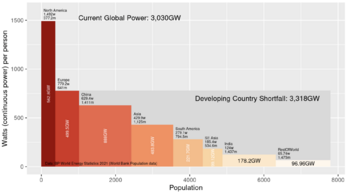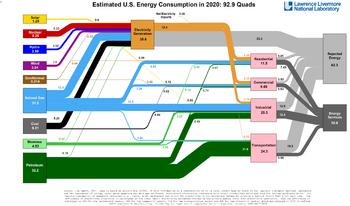User:David MacQuigg/Sandbox/drafts: Difference between revisions
No edit summary |
|||
| (One intermediate revision by the same user not shown) | |||
| Line 1: | Line 1: | ||
= Nuclear Power Reconsidered = | = Nuclear Power Reconsidered = | ||
After decades of failure | After decades of failure to slow the rising global consumption of [[Fossil_fuel|coal, oil and gas]],<ref name=GlobalEnergyGrowth /> influential public figures, including Bill Gates and Elon Musk, have concluded that the world needs to '''reconsider nuclear power''' as a means to end the burning of fossil fuels.<ref name=PublicFigures /> Wind and solar power alone, without large-scale [[Energy_storage|storage]] for these intermittent sources, are unlikely to meet the world's needs for reliable energy.<ref name=StoringPower1 /><ref name=StoringPower2 /><ref name=StoringPower3 /> See Figures 1 and 2 on the magnitude of the world energy challenge. | ||
Nuclear power could provide the abundant, zero-carbon, dispatchable<ref name=LoadFollowing /> energy needed for a low-carbon future, but not by simply building more of what we already have. New innovative designs for [[Nuclear reactor|nuclear reactors]] are needed to avoid the problems of the past. | Nuclear power could provide the abundant, zero-carbon, dispatchable<ref name=LoadFollowing /> energy needed for a low-carbon future, but not by simply building more of what we already have. New innovative designs for [[Nuclear reactor|nuclear reactors]] are needed to avoid the problems of the past. | ||
| Line 7: | Line 7: | ||
{{Image|Energy US 2020.png|right|350px|Fig.2 Electricity is only one third of the CO2 problem. Other big needs include low-cost high-temperature process heat for industry <ref name=Fig2imageA /> and fuels for the transportation sector.<ref name=Fig2imageB />}} | {{Image|Energy US 2020.png|right|350px|Fig.2 Electricity is only one third of the CO2 problem. Other big needs include low-cost high-temperature process heat for industry <ref name=Fig2imageA /> and fuels for the transportation sector.<ref name=Fig2imageB />}} | ||
== Deleted words == | |||
electricity to the grid regardless of weather. | electricity to the grid regardless of weather. | ||
, and while nuclear fuel is not renewable, nuclear power generation produces little air pollution as compared with coal, oil or gas. Demand for electricity is high and still increasing, and wind and solar generators will not be able to meet the demand. Meeting the world's needs for reliable carbon-free electricity generation could require thousands of nuclear plants, or perhaps a breakthrough in technology to [[Energy_storage|store energy]] from wind and solar.<ref name=StoringPower1 /><ref name=StoringPower2 /><ref name=StoringPower3 /> | , and while nuclear fuel is not renewable, nuclear power generation produces little air pollution as compared with coal, oil or gas. Demand for electricity is high and still increasing, and wind and solar generators will not be able to meet the demand. Meeting the world's needs for reliable carbon-free electricity generation could require thousands of nuclear plants, or perhaps a breakthrough in technology to [[Energy_storage|store energy]] from wind and solar.<ref name=StoringPower1 /><ref name=StoringPower2 /><ref name=StoringPower3 /> | ||
Latest revision as of 13:06, 9 January 2023
Nuclear Power Reconsidered
After decades of failure to slow the rising global consumption of coal, oil and gas,[1] influential public figures, including Bill Gates and Elon Musk, have concluded that the world needs to reconsider nuclear power as a means to end the burning of fossil fuels.[2] Wind and solar power alone, without large-scale storage for these intermittent sources, are unlikely to meet the world's needs for reliable energy.[3][4][5] See Figures 1 and 2 on the magnitude of the world energy challenge.
Nuclear power could provide the abundant, zero-carbon, dispatchable[6] energy needed for a low-carbon future, but not by simply building more of what we already have. New innovative designs for nuclear reactors are needed to avoid the problems of the past.

Fig.1 Electricity consumption may soon double, mostly from coal-fired power plants in the developing world.[7]
Deleted words
electricity to the grid regardless of weather.
, and while nuclear fuel is not renewable, nuclear power generation produces little air pollution as compared with coal, oil or gas. Demand for electricity is high and still increasing, and wind and solar generators will not be able to meet the demand. Meeting the world's needs for reliable carbon-free electricity generation could require thousands of nuclear plants, or perhaps a breakthrough in technology to store energy from wind and solar.[3][4][5]
- ↑ Cite error: Invalid
<ref>tag; no text was provided for refs namedGlobalEnergyGrowth - ↑ Cite error: Invalid
<ref>tag; no text was provided for refs namedPublicFigures - ↑ 3.0 3.1 Cite error: Invalid
<ref>tag; no text was provided for refs namedStoringPower1 - ↑ 4.0 4.1 Cite error: Invalid
<ref>tag; no text was provided for refs namedStoringPower2 - ↑ 5.0 5.1 Cite error: Invalid
<ref>tag; no text was provided for refs namedStoringPower3 - ↑ Cite error: Invalid
<ref>tag; no text was provided for refs namedLoadFollowing - ↑ Cite error: Invalid
<ref>tag; no text was provided for refs namedGordianKnotFig1.3 - ↑ Cite error: Invalid
<ref>tag; no text was provided for refs namedFig2imageA - ↑ Cite error: Invalid
<ref>tag; no text was provided for refs namedFig2imageB
